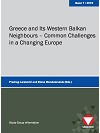Greece and Its Western Balkan Neighbours - Common Challenges in a Changing Europe
37th Workshop of the PfP Consortium Study Group "Regional Stability in South East Europe”
Dokumenttyp:
Study Group InformationErscheinungsdatum:
April 2019Herausgeber:
Dr. Predrag Jureković, Dr. Elena MandalenakisVerlag:
Study Group Information - Austrian National Defence Academy in co-operation with the PfP Consortium of Defense Academies and Security Studies InstitutesISBN:
978-3-903121-66-9Seiten:
203Autor(en):
Theodoros Christopoulos, Sini¹a Dostiæ, Sa¹a Gosiæ, Mario Holzner, Dr. Predrag Jureković, Mladen Kakuæa, Patrick Larkin, Magdalena Lembovska, Dr. Elena Mandalenakis, Prof. Dr. Ayse Nilufer Narli, Vladimir Nikitović, Director Albert Rakipi, Berna Turam, Martin VladimirovBeiträge in dieser Publikation:
Vorwort
There is more that Greece and its Western Balkan neighbours have in common than separates them. This publication of the 37th workshop of the Study Group "Regional Stability in South East Europe” ascertains the shared interests and challenges that require fostering good neighbourly relations for the above-mentioned states. Positive and critical aspects of bilateral relations are analysed in depth, common tasks regarding transnational as well as social and economic challenges are identified. Finally, possible paths for guaranteeing energy security in this part of Europe and beyond in the future are outlined.



